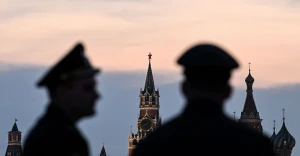
FSB claims to have found traces of explosives on ship from Turkey heading to Russia
Russian security agency said it allegedly discovered another foreign civilian ship with traces of explosives on board, which was heading from Turkey to the Russian Federation
This is reported by the Russian RIA Novosti with reference to the FSB.
“FSB found another foreign civilian ship that might have been used to bring explosives to Ukraine. They discovered traces of TNT and dinitrotoluene on the boat of the foreign cargo ship BMO River. The ship was traveling from Sinop in Turkey to Rostov,” the statement said.
The same ship apparently visited the Ukrainian port of Reni two times in June and July.
The Russian authorities decided to stop the ship from passing through the Kerch Strait.
Earlier, the FSB claimed to have found traces of explosives on a dry cargo ship traveling from Turkey to Rostov-on-Don through the Kerch Strait on July 22. The ship was supposed to load grain in Rostov.
Russia's termination of the grain deal
On July 16, the last ship loaded with Ukrainian agricultural products under the initiative left the port of Odesa. On 17 July, Russia announced the termination of the grain deal. In response, Volodymyr Zelenskyy said that it was necessary to continue using the grain corridor even despite Russia's withdrawal from the agreement. And Kuleba began urgent consultations at the UN.
The White House condemned Russia's withdrawal from the grain deal, which played a crucial role in reducing global food prices.
On 18 July, Russian presidential spokesman Dmitry Peskov said there were "certain risks" for parties trying to resume the Black Sea Grain Initiative without Russia's participation.
European Commission President Ursula von der Leyen said that it was critical to restore transport links across the Black Sea to provide food to the world's most vulnerable countries and to preserve the ability to export Ukrainian goods.
On 19 July, it was reported that Ukraine was considering transporting food as part of the grain initiative through the territorial waters of Bulgaria and neighbouring Romania.
At the same time, the Russian Ministry of Defence issued a statement threatening ships heading to Ukraine's Black Sea ports. On the same day, Putin named the conditions for Russia's return to the grain deal and demanded their immediate implementation
The EU's top diplomat, Josep Borrell, said that the only response to Russia's threats to fire on Ukrainian grain ships could be to increase military aid to Ukraine.
Ukraine’s Ministry of Defense announced that starting July 21, all ships heading to the Black Sea in the direction of Russian seaports and Ukrainian ports in the temporarily occupied territory may be treated by Ukraine as military cargo.
On July 21, Recep Tayyip Erdogan said he wanted to discuss the extension of the grain deal with his Russian counterpart Vladimir Putin and expressed confidence that it will work again.
The same day, US Secretary of State Antony Blinken expressed hope that Turkey will help bring Russia back to the Black Sea Grain Initiative, which it disrupted earlier in the week.
On July 25, the GUR (Main Intelligence Directorate) released a report to the Russian Federation's leaders, revealing the technologies used to stop Ukraine's grain export. This suggests a deliberate plan to disrupt the grain deal.
On the same day, the US State Department mentioned that amid the shelling of Odesa and the Danube infrastructure, Russia was getting ready for an operation in the Black Sea using a foreign-flagged ship in international waters.
Russia has added more sea mines near Ukrainian ports to explode civilian ships and then wrongly accuse Ukraine for these actions.
- News














































